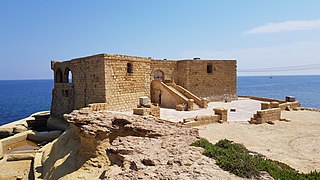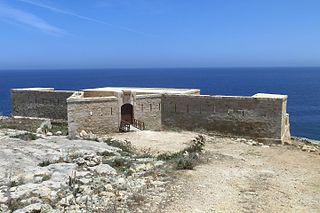
Saint Mary's Tower, also known as the Comino Tower, is a large bastioned watchtower on the island of Comino in Malta. It was built in 1618, the fifth of six Wignacourt towers. The tower was used by the Armed Forces of Malta until 2002, and it is now in the hands of Din l-Art Ħelwa.

Qolla l-Bajda Battery is an artillery battery in Żebbuġ, Gozo, Malta. It was built by the Order of Saint John in 1715 and 1716 as one of a series of coastal fortifications around the coasts of the Maltese Islands. It retained its original layout until the late 1970s, when it was converted into a discothèque and snack bar known as Rook and major alterations were made to the battery. The building, in the midst of a legal battle between the government and a private company, is now abandoned and in a dilapidated state.

Saint Anthony's Battery is an artillery battery in Qala, Gozo, Malta. It was built by the Order of Saint John in 1731 and 1732 as one of a series of coastal fortifications around the coasts of the Maltese Islands. It is one of only two surviving batteries on Gozo, the other one being Qolla l-Bajda Battery in Żebbuġ.

Mistra Battery, formerly also known as Despirasse Battery, is an artillery battery in Mistra Bay, Mellieħa, Malta. It was built by the Order of Saint John in the 18th century as one of a series of coastal fortifications around the coasts of the Maltese Islands.

Westreme Battery, also known as ir-Rasus Battery or Mellieħa Right Battery, is a former artillery battery in Mellieħa, Malta. It was built by the Order of Saint John in 1715–1716 as one of a series of coastal fortifications around the Maltese Islands.

Ferretti Battery, also known as Qajjenza Battery or Saint George's Battery, is an artillery battery in the village of Qajjenza, within the limits of Birżebbuġa, in Malta. It was built by the Order of Saint John in 1715 and 1716 as one of a series of fortifications around the coasts of the Maltese Islands. A restaurant exists within the walls of the battery, serving Mediterranean cuisine.

Vendôme Battery, also known as Ta' Maċċu Battery, is an artillery battery near Armier Bay, limits of Mellieħa, Malta. It was built by the Order of Saint John in 1715–1716 as one of a series of coastal fortifications around the Maltese Islands.

Wied Musa Battery, also known as Swatar Battery, is a former artillery battery in Marfa, limits of Mellieħa, Malta. It was built by the Order of Saint John in 1714–1716 as one of a series of coastal fortifications around the Maltese Islands.
Fedeau Battery was an artillery battery in Mellieħa, Malta. It was built by the Order of Saint John in 1714-16 as part of a series of coastal fortifications around the Maltese Islands, and demolished in the 20th century.

Riħama Battery is an artillery battery in Marsaskala, Malta. It was built by the Order of Saint John in 1714–1716 as one of a series of coastal fortifications around the coasts of the Maltese Islands. The battery still exists, although it is in a dilapidated state with part of it having collapsed.

Pinto Battery, also known as Għżira Battery or Kechakara Battery, is a former artillery battery in Birżebbuġa, Malta. It was built by the Order of Saint John in 1715 and 1716 as one of a series of coastal fortifications around the coasts of the Maltese Islands. The battery has been heavily altered over time, and the blockhouse now houses a bar and a garage, while the gun platform and parapet have been largely destroyed, with only the general outline still visible.

Qalet Marku Battery, also known as D'Orbeau Battery, was an artillery battery in Baħar iċ-Ċagħaq, within the limits of Naxxar, Malta. It was built in 1715–1716 by the Order of Saint John as one of a series of coastal fortifications around the Maltese Islands. The battery has been largely destroyed, but some remains can still be seen.

Qalet Marku Redoubt was a redoubt in the limits of Naxxar, Malta. It was built in 1715–1716 by the Order of Saint John as one of a series of coastal fortifications around the Maltese Islands. It was demolished to make way for the coast road; its remains are possibly still buried under the road.

Buġibba Battery, also known as Elbene Battery, was an artillery battery in Buġibba, limits of St. Paul's Bay, Malta. It was built in the 18th century, by the Order of St. John, as one of a series of coastal fortifications around the coasts of the Maltese islands. The battery no longer exists, but its rock-hewn ditch and some foundations can still be noticed.

Arrias Battery, also known as Xemxija Battery or Pwales Left Battery, is an artillery battery in Xemxija, limits of St. Paul's Bay, Malta. It was built by the Order of Saint John in 1715–1716 as one of a series of coastal fortifications around the Maltese Islands. The battery still exists, although it has modern alterations, and it is used as a restaurant.

Ramla Right Battery, also known as Gironda Battery or Nadur Battery, was an artillery battery in Ramla Bay, in the limits of Nadur on the island of Gozo, Malta. It was built by the Order of Saint John in 1715–1716 as one of a series of coastal fortifications around the Maltese Islands. The battery now lies in ruins.

Ramla Left Battery, also known as Belancourt Battery or Xagħra Battery, was an artillery battery in Ramla Bay, within the limits of Xagħra on the island of Gozo, Malta. It was built by the Order of Saint John in 1715–1716 as one of a series of coastal fortifications around the Maltese Islands. The battery now lies in ruins.
Balbani Battery, also known as Bengħisa Battery or Saint Catherine's Battery, was an artillery battery in Birżebbuġa, Malta. It was built by the Order of Saint John on commands by Grand Master Manuel Pinto da Fonseca and was completed in 1721. The battery was named for Cristoforo Balbani, who partially financed its construction. It was one of a series of coastal fortifications around the Maltese Islands.
Saint Mary's Redoubt, also known as Migart Redoubt, was a redoubt on the island of Comino in Malta. It was built, mainly with limestone, by the Order of Saint John in 1716 or 1761 as one of a series of coastal fortifications around the Maltese Islands.
Saint Mary's Battery, also known as Qolla s-Safra Battery or Gironda Battery, was an artillery battery in Marsalforn, limits of Żebbuġ, Gozo, Malta. It was built by the Order of Saint John in 1715 as one of a series of coastal fortifications around the Maltese Islands.


















